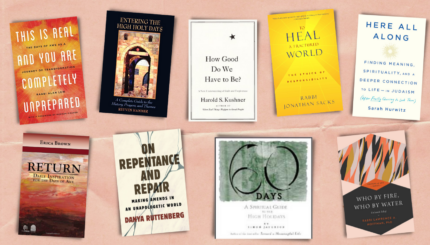Years ago, I faced a summer’s end with a series of five deaths in the tiny congregation I served as a young rabbi. High Holiday preparations that year were especially difficult. I remember the funeral director observing that deaths seemed to cluster around holiday times.
Liminal moments are fraught. Indeed, my own father and my brother each died within two weeks of Rosh Hashanah, both at a young age. Life and death are on my mind at this time of year.
This year brings a heightened consciousness of life and death. The barbaric beheadings of two American journalists terrorizes us. Massacres of thousands of innocents by fanatical Islamists are incomprehensible. How could this death cult come from a religious tradition?
David Brooks, (NY Times, 9/4/14) reflected, “By going beneath even the minimal standards of modern civilization, the militants in the Islamic State in Iraq and Syria…show contempt for us and our morality.” They terrorize us by their “unbounded violence,” denying our common humanity. Brooks observes: “ISIS will get inside our heads in the darkest way” because a beheading is “a defacement of something sacred that should be inviolable.”
At the New Year, we pray that the quality of our lives will align with our hopes and dreams through repentance. One High Holiday prayer,
Unetaneh Tokef,
written during dark times of violent persecution, imagines a heavenly court judging us on the New Year. It voices a deep fear that we may fall victim to a terrible fate or die with unfinished business. But it proclaims that “repentance, prayer and tzedakah” (righteous acts) can “avert the evil decree.”
We know that life is fragile; any day could unexpectedly be our last. We pray that we can complete our soul’s mission before we die. We yearn to be inscribed and sealed in the Book of Life for good. We yearn for life. We have the power to shape the quality of our living, to fulfill our soul’s purpose.
Why does murder specifically by beheading make us so sick? David Brooks wrote, the “infusion of the spiritual and the material is mysterious.” For Jews, the human body is a “transcendent temple worthy of respect.” These murderous zealots violate our basic belief that life is good. “The truest version of each Abrahamic faith revels in the genuine goodness of creation.”
The Torah instructs, “I call heaven and earth to witness against you this day: I have put before you life and death, blessing and curse. Choose life — if you and your offspring would live — by loving the LORD your God, heeding God’s commands, and holding fast to God.” (Deuteronomy 30:19 – 20)
How will we cope this trauma and our fears this holiday? We will choose life, through repentance, prayer and tzedakah/righteous acts. Indeed, we will celebrate goodness and the potential for godliness. Our antidote to the cult of death is a life of faith in goodness.
Torah
Pronunced: TORE-uh, Origin: Hebrew, the Five Books of Moses.



